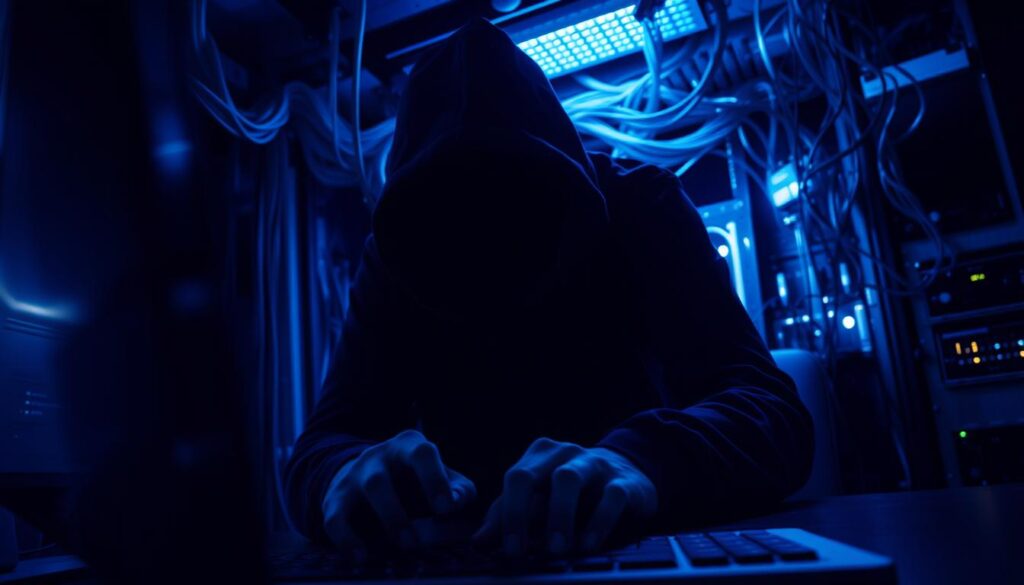Have you ever thought about how safe your personal info is today? With more digital breaches happening, it’s key to keep your data safe. In the Philippines, small businesses are moving to digital attendance systems. This makes encryption for data security even more important.
Encryption is now a must to stop unauthorized access. It helps keep employee trust and follows data protection laws. Knowing how encryption protects privacy is vital today.
In 2020, the National Privacy Commission in the Philippines fined companies over PHP 45 million for data privacy breaches. Encryption is a strong defense against these threats. The Ponemon Institute found encryption is the top security measure against data breaches.
Encryption plays a big role in protecting our data. With more data breaches and identity theft, using encryption is not optional. It’s a must.
Key Takeaways
- Encryption is essential for safeguarding sensitive attendance data from unauthorized access.
- Organizations in the Philippines face substantial penalties for data privacy violations.
- Regular security audits can significantly reduce data breach costs.
- As cybersecurity threats evolve, incorporating encryption should be a priority for all organizations.
- Understanding the difference between symmetric and asymmetric encryption is crucial for effective data protection.
Understanding the Importance of Attendance Data Security
In today’s digital world, keeping attendance data safe is more important than ever. Attendance systems hold sensitive information like work hours and payroll. A breach can cause big problems, like legal trouble and damage to reputation.
Recent stats show that about 60% of small to medium-sized businesses face a data breach in their first six months. This is often because they don’t have strong security in place.
Ignoring privacy protection can lead to big consequences. Companies that don’t follow data protection rules could face fines of up to 4% of their annual turnover. This is a big reason why strong cybersecurity measures are needed to protect attendance data.
Employees are very concerned about their data privacy. A survey found that 75% of them see it as a top issue. This shows how important it is to build trust and have a solid data protection plan for attendance management.
In the Philippines, companies need to focus on data security more than ever. There’s a growing awareness about data privacy, making it crucial for businesses to stay compliant. By using advanced technologies and strategies like role-based access control, companies can lower the risk of data breaches and improve their security.
| Data Security Statistics | Impact on Organizations |
|---|---|
| 60% of small to medium-sized businesses face a breach within six months | Increased operational risk |
| 75% of employees are concerned about data privacy | Trust is essential for employee retention |
| 4% penalty on global turnover for non-compliance | Financial strain and reputational damage |
| Companies implementing role-based access controls can reduce data exposure risk by 80% | Strengthened security posture |
The Risks of Unauthorized Access to Attendance Systems
Unauthorized access to attendance systems is a big threat to organizations. It can lead to serious issues like identity theft and financial fraud. Companies must focus on strong cybersecurity to avoid these problems.
Consequences of Data Breaches
Data breaches can cause more than just financial loss. They can cost an average of 221 million pesos, as IBM’s report shows. Small businesses are often targeted, making security even more crucial.
Human mistakes cause 95% of security breaches. This shows how important it is to train employees well. Using multi-factor authentication can cut down unauthorized access by 99.9%. Keeping software up to date also helps, as it makes companies 30% less likely to get breached.
Real-World Examples of Data Breaches in Attendance Systems
There have been many data breaches in different places. Schools and businesses in the Philippines have been hit hard. Phishing attacks, which are behind 90% of breaches, highlight the need for employee training.
Tailgating, where people sneak in, causes 28% of breaches. This shows how cyber criminals use many tactics to get what they want.

How Encryption Enhances Data Security
Encryption is key to keeping data safe by making it unreadable to unauthorized users. It’s a must-have for 95% of organizations to protect their data. With 80% of data breaches caused by weak passwords, strong encryption is essential for attendance systems.
Encryption makes sure communications stay secure and reduces the chance of data breaches. Companies that use encryption can lower breach risks by up to 50%. This helps avoid the average 243 million pesos cost of a breach. It makes workplaces safer, allowing for the secure handling of employee data like attendance records.
Using both symmetric and asymmetric encryption methods adds extra security. Symmetric encryption, like AES, is much faster than asymmetric. By 2023, 70% of companies use both, showing a strong commitment to data security. The PCI DSS requires encryption for customer payment card data, showing the industry’s dedication to secure communication.
Ransomware attacks have jumped by 150% in a year, often targeting weak encryption. Strong encryption not only boosts security but also improves a company’s reputation. About 85% of businesses say encryption increases customer trust, which is crucial in today’s market.
Common Encryption Methods Used for Data Protection
In the world of cybersecurity, knowing about encryption methods is key to keeping data safe. Symmetric and asymmetric encryption are two main types. They each have their own strengths, important for data protection in the Philippines.
Symmetric vs Asymmetric Encryption
Symmetric encryption uses one key for both encrypting and decrypting. It’s fast and good for big data. AES is a top choice worldwide, known for its strength.
Asymmetric encryption uses two keys: a public one for encrypting and a private one for decrypting. RSA is a well-known example, great for internet security. But, it can be slow with big data.
Encryption Algorithms and their Effectiveness
Choosing the right encryption algorithm depends on your needs and threats. Twofish, for example, is fast and secure, making it popular. NIST plans to stop using Triple DES by 2023 because of its weaknesses.
Good encryption is crucial in today’s cybersecurity world. Human mistakes cause many data breaches. So, it’s important to manage encryption keys well and know which data to protect.

Implementing Encryption for Attendance Data
Encrypting attendance data is crucial for companies in the Philippines. It keeps employee info safe and follows local privacy laws. First, check your systems to see where encryption can help.
Choosing the right encryption is important. AES-256 is strong and protects data well. It can cut down data breach risks by 80%. This saves money, as data breaches cost about 243 million pesos on average.
Keeping encryption up to date is key. Regular checks and employee training are vital. A survey shows 60% of employees feel safer with strong data protection.
Following data protection laws is a must. Companies must handle biometric data carefully. They need clear policies and consent from employees. This keeps data safe and boosts the company’s image.
| Encryption Features | Benefits |
|---|---|
| Robust Protocols (e.g., AES-256) | Prevents unauthorized data access |
| Regular Security Audits | Identifies potential vulnerabilities |
| Employee Training | Reduces human error in data handling |
| Clear Retention Policies | Ensures timely data deletion |
Using these encryption methods makes data safe. It shows staff and others that the company cares about data protection and follows the rules.
The Role of Multi-Factor Authentication in Data Security
Multi-factor authentication (MFA) is key to keeping data safe, mainly for systems with sensitive employee data. It adds extra steps to verify who you are, making it hard for hackers to get in. This way, companies can lower the risk of data leaks a lot.
In the Philippines, fighting cyber threats is more important than ever. In 2022, over 2000 data breaches were reported, mostly due to hacking. It’s vital for companies to keep up with new threats. Most breaches happen because of human mistakes, so strong security is crucial.
MFA uses different ways to check who you are, like SMS codes, biometrics, and apps. This mix makes it harder for hackers to get in. Companies that use MFA well can cut their breach risk by about 30%.

Also, using MFA with encryption makes data even safer. Encryption, like AES and RSA, locks down sensitive info, making it hard for hackers to access. Training employees to be vigilant is key to keeping data safe, showing the importance of strong security rules in companies.
| Key Components of MFA | Benefits |
|---|---|
| Knowledge Factor (Password) | Initial layer of defense; known only to the user |
| Possession Factor (Mobile Device) | Provides additional confirmation via SMS or app |
| Inheritance Factor (Biometric) | Unique traits such as fingerprints or facial recognition |
Using MFA as part of a solid data security plan keeps information safe and builds trust with clients. With 60% of small businesses failing after a cyberattack, using advanced security like MFA is not optional; it’s essential.
Data Security Measures Beyond Encryption
Protecting data goes beyond just encryption. A good plan includes access control, regular audits, and constant monitoring. These steps help keep sensitive data safe and secure.
Access Control Mechanisms
Access control is key to keeping attendance data safe. Role-Based Access Control (RBAC) is a smart way to limit who can see what. It lets employees access only what they need for their jobs.
Multi-Factor Authentication (MFA) adds an extra layer of security. It makes it harder for hackers to get in. With ransomware attacks up 27%, this is more important than ever.
Regular Audits and Monitoring Procedures
Regular security audits are a must to find and fix weak spots in attendance systems. They help improve data security. With 93% of IT pros seeing more threats, constant checks are crucial.
Data Loss Prevention (DLP) tools are also important. They help spot and block sensitive data. This is key when a data breach can cost 459 million pesos. Regular checks help avoid big financial losses.
The Importance of Compliance with Data Protection Laws
Following data protection laws is key for businesses in the Philippines. The Data Privacy Act of 2012 outlines strict rules to protect data. Companies must understand their duties to keep sensitive information safe and be accountable for how they handle it.
Ignoring these laws can result in heavy fines, hurting a company’s finances and reputation. With data breaches on the rise, knowing the legal rules is vital. Every day, about 2.5 quintillion bytes of data are created, making poor data management risky.
Following data protection laws helps companies avoid penalties and gain trust from their customers. Using technologies like encryption is crucial to keep data safe from unauthorized access.
Seeing data privacy as more than just a legal requirement is important. It’s a chance to improve data management and gain customer trust. Small and medium-sized enterprises (SMEs) that focus on compliance can succeed in a competitive market where data security is a top concern.
How Organizations in the Philippines Benefit from Encryption
Organizations in the Philippines gain a lot from encryption. It’s key for keeping data safe, like personal and financial info. Encryption makes sure only the right people can see this info.
It also keeps data safe by checking it’s the same when it’s sent. This is done with hash algorithms. Plus, digital signatures help prove who sent and received messages. Training staff on how to use encryption is also important.
Cybercrime is getting worse, and encryption helps fight it. It helps businesses avoid big losses from data breaches. A big e-commerce company in Manila saw a big drop in security issues and more trust from customers after using encryption.
Following the rules is also important. Companies that use encryption meet data protection laws. This makes 70% of consumers in the Philippines trust them more. It also makes their reputation stronger and helps with cybersecurity in the area.
For more on how cybersecurity and business success go together, check out cloud computing benefits for Philippine businesses.
| Benefit | Description |
|---|---|
| Data Protection | Ensures confidentiality and safeguards sensitive information. |
| Integrity Assurance | Uses hash algorithms to confirm data accuracy during transmission. |
| Reputation Enhancement | Builds trust with clients by demonstrating a commitment to data security. |
| Cost Reduction | Minimizes financial losses associated with data breaches. |
| Compliance | Aligns with data protection laws to ensure organizational trust. |
Future Trends in Encryption and Data Security
Data security is changing fast as cyber threats grow. In places like the Philippines, digital systems are key. New encryption trends will shape how we keep data safe.
Quantum-resistant algorithms are becoming important. Old encryption methods like RSA and ECC might not work against quantum computers. NIST is working on new, safe algorithms for data security.
Homomorphic encryption is another big trend. It lets encrypted data be worked on without decrypting it. This is great for keeping sensitive info safe in healthcare and finance. Big tech companies like Microsoft and Google are leading in this area.
Zero Trust security is also on the rise. It means using many layers to check who and what can access data. Adding encryption to Zero Trust will help protect against data breaches.
Multi-Party Computation (MPC) is another exciting trend. It lets different groups work together without sharing their data. This is good for industries that need to keep data private while working together.
Using machine learning with encryption is also a trend. It helps keep training data and models safe. Privacy techniques like federated learning and differential privacy are used to protect data in machine learning.
Good key management is key to encryption success. Cloud-based key management services are getting better. Even blockchain is being looked at for better security and efficiency.
Phishing attacks caused 90% of data breaches in 2021. This shows how important strong cybersecurity is. Companies plan to spend more on encryption tools to protect their data.

| Trend | Description | Impact on Data Security |
|---|---|---|
| Quantum-resistant Algorithms | Algorithms designed to withstand potential quantum computing attacks. | Essential for safeguarding future-sensitive data. |
| Homomorphic Encryption | Enables processing of encrypted data without decryption. | Enhances privacy in data analytics. |
| Zero Trust Models | A security concept relying on strict identity verification. | Limits unauthorized access and strengthens data protection. |
| Multi-Party Computation (MPC) | Allows collaborative computations while keeping inputs confidential. | Boosts privacy in shared environments. |
| Machine Learning Integration | Combines encryption techniques with ML to protect sensitive data. | Secures ML models and training data. |
By keeping up with these trends, companies in the Philippines can improve their data protection. This helps fight cyber threats and follow new privacy rules.
Conclusion
The role of encryption in data protection is crucial. It’s seen as vital by 90% of companies to keep data safe. For small and medium businesses in the Philippines, using strong encryption is key to avoiding unauthorized access.
With 64% of data breaches caused by unauthorized access, the need for good encryption is clear. Companies that use encryption well can cut their data breach risk by up to 80%. This shows how important it is to invest in these technologies.
Also, 80% of companies struggle with following data protection rules. This shows how encryption helps meet these rules. In today’s digital world, having a strong cybersecurity culture is essential.
Companies need to use encryption, access controls, and follow rules to keep data safe. This builds trust with customers. By focusing on these steps, businesses can make their operations safer for everyone. For more on data protection strategies, learning about encryption is a good start.
